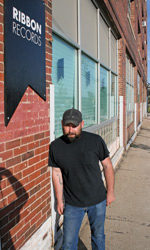Records? They still make records?
Why yes, haven’t you heard? Vinyl is back!
In fact, the so-called vinyl resurgence has been unfolding for more than a decade, but the story gains traction with each year of increased sales. In 2011, vinyl records represent a singular bright spot on the landscape of a music industry in shambles.
The Long Tail
As compact discs continue the long march to obsolescence, sales of vinyl records have reached their highest levels since 1991, according to Nielsen SoundScan. With 2.8 million units sold last year—not including used LPs—vinyl sales increased 14 percent over 2009, even as overall music sales dropped by 13 percent.
Offering greater portability and convenience, mp3s and other digital formats have just about killed off CDs, with the aid of one surprising accomplice. “Vinyl May Be Final Nail in CD’s Coffin” reads one headline from a 2007 story on the “vinyl resurgence,” illustrating this great irony. It seems that vinyl, a format once thought extinct, is helping to bury the CD, the very same thing that had supposedly wiped it out 20 years earlier.
Clearly, the decades-long upswing in vinyl sales represents more than a fad, but the truth is that vinyl never really went away. It may have disappeared in the mass market in the early 1990s, but below the radar, vinyl stayed alive, embraced by punks and indie rockers, rappers and ravers, DJs, jazz buffs, audiophiles and aging hippies alike.
But for all the hype, vinyl still accounts for just a single percent of music industry sales. The resurgence is real, but it’s a limited, niche market. And yet, hastened by the Internet, the fracturing of popular culture and the decline of the mass-market blockbuster have helped clear a wide path for that very thing. In today’s marketplace, niche is where it’s at.
 A Dreamin’ Man
A Dreamin’ Man
Dan Plaag had a dream. Like many vinyl collectors, the 27-year-old electrician had always wanted to own a record store. “I’d been good friends with Danny for many years,” said Noah Lambert, 28. “He would always say, ‘I should start a record store, I should start a record store.’ And I always said, you know, that’s a terrible idea.”
One day, in need of a new cartridge for his turntable, Plaag found himself down at the Murray Building, where high-end audio retailer Electronics Diversified had recently relocated. Noticing an empty space adjacent to the store, a light bulb went off in his head. Several weeks later, he met with building owner George Murray. The rent was reasonable. Plaag was in. His dream was coming to life.
His wife wasn’t exactly thrilled, at first. “He kind of had to talk me into it,” said Nikki Plaag, smiling. “We’d only been married a year and a half, and didn’t have money to put into it.” But neither was she dead-set against the prospect. A longtime music fan, she found her husband’s passion had rubbed off on her. She began eyeing records on her weekly thrifting runs, and the couple would sometimes go out on the hunt together.
And so, she supported his dream. Nevertheless, “I was scared,” she admitted. “I told him from the beginning: no way are you quitting your job!”
Why Vinyl?
So why vinyl, anyway? “Obviously, it’s not convenience,” laughs Dan Plaag, gesturing at stacks of heavy, coal-black wax to be cleaned up, sorted and priced, a process that will take many hours. He’s a bit unsure exactly how he got into it in the first place.
“I guess it started with just the love of music itself. Not to sound cliché, but I heard ‘Stairway to Heaven’ for the first time when I was about eight, and I thought it was the coolest thing ever.” A copy of Led Zeppelin IV turned Plaag into a music collector, and at some point along the way, he started picking up vinyl.
Despite their overall inconvenience, vinyl records offer a number of advantages over their digital counterparts.
1. It sounds better. Without getting too technical, analog recordings are direct representations of actual sound waves; digital recordings are compressed strings of zeroes and ones. “It sounds warmer,” says Plaag. “The tones are richer.”
Most audiophiles agree. “If you can’t tell the difference between analog and digital music,” a customer remarks to Plaag, “you’re just not paying attention.” To be sure, a good turntable and quality audio equipment are integral parts of the equation, as is the proper care and storage of your collection.
 2. It’s art. Can you imagine hanging an mp3 on your wall? I would guess not. With its reflection of the cultural zeitgeist, album art was a vital part of pop culture for nearly half a century. If you enjoy reading liner notes or looking at the artwork, a CD simply does not compare, much less a PDF.
2. It’s art. Can you imagine hanging an mp3 on your wall? I would guess not. With its reflection of the cultural zeitgeist, album art was a vital part of pop culture for nearly half a century. If you enjoy reading liner notes or looking at the artwork, a CD simply does not compare, much less a PDF.
But it’s more than just the cover art. It’s everything…from the larger size and special packaging, to the weight and color of the vinyl, to the gatefold sleeve and goodies that may be hidden inside. It’s the whole package. It’s art.
3. It’s the object. For all of the liabilities of ownership, there is value in a tangible, physical object that you can hold in your hands and call your own. It’s an artifact, a container for sentiment and memories that tells its own unique story and creates a connection.
For most of history, music could only be enjoyed at a live performance. The idea that you could “own” music and listen to it on demand only came about in the 20th century. Today, music is again becoming less something we own, and more something we access. With the rise of streaming music services like Pandora, digital files no longer even reside on your own computer; they lie somewhere “in the cloud.” The cloud requires neither pressing plant nor moving truck—great for convenience and cost, for sure—but lost are the tactile sensation and feelings of ownership and connection.
4. It provides identity. For some, vinyl provides a certain cachet. It offers entrée into a subculture, membership in a secret club, instant credibility in some circles. Like all passions, it’s a way to connect with other like-minded people. It gives you a hobby to pursue. It’s collectors defined by their collections. It’s vinyl snobs and record geeks scoffing at the masses. It’s hipsters in training, embracing the format. It’s retro chic.
5. It makes a statement. Like a long, slow-cooked meal, or anything, really, that requires an attention span of more than 30 seconds, it’s somewhat of a statement against the modern norm. Vinyl rejects convenience, defies practicality and protests against ease of use. It’s a small rebellion against the march of progress.
6. It’s an experience. In an increasingly digital world, a premium is placed on real-world experience. From the thrill of the hunt—something the Internet has all but destroyed—to the listening experience itself, vinyl offers something tangible, something that can’t be copied and pasted. “It’s not like putting on your iPod and going jogging,” says Plaag. “You have to physically pick up a record and put a needle on it. It’s an event. You sit down, you focus in on it, and you really listen to music.
“It’s the experience,” he adds. “For me, that’s the whole thing.”
Cutting the Ribbon
So Plaag was getting his record store, and Lambert signed on to help make his friend’s dream real. But with little in the way of startup money, the first question was: Where will the records come from?
“You could try to get a small business loan and buy a bunch of new vinyl,” mused Lambert, “but that’s a huge risk, and probably wouldn’t have worked out.” That’s when they hit on the idea of consignment. Plaag would use his personal collection to get the store off the ground, while seeking other collectors who want to make a few bucks as consigners. Given enough interest, they could build inventory without spending a dime.
Plaag approached one acquaintance, who loved the idea. It was far easier than posting records on eBay, and more lucrative than unloading them at another record store for dimes on the dollar. By the time Ribbon Records launched in March, there were three consigners. Today, there are nearly 30.
Just one issue remained. Who would mind the store during the week? After all, Plaag had a day job he couldn’t leave. After some trial and error, the chosen solution was simple and elegant. “Vinyl only. Saturdays only.”
Vinyl Only
No CDs, DVDs or VHS tapes. No posters, t-shirts or accessories. From the product to the logo to the store itself, everything at Ribbon Records has been stripped to its essentials. With the elegance of Apple, a minimalist aesthetic flows through all they do. The ribbon logo is as simple as it gets. Promotional text is succinct and tight, framed in a sea of white space, the fingerprints of Noah Lambert, who studied product and industrial design at Southern Illinois University.
“I like everything to be clean and simple and to the point,” he explains. “If you think about a [typical] record store…most of the time, the walls are completely covered with posters and all this visual clutter. Our concept was to cut all that out. We’re interested in one product—used vinyl records. It’s simple and to the point. It’s the only thing we do.”
As for the store’s name? “We wanted records to be in the title,” said Lambert. “All of the great, old record labels…it was always: Something Records. It also tells the public who we are.” Looking for another “r” word that sounded right, he went through the dictionary and listed all the possibilities. “Then we took that list and ran it through godaddy.com to see what domains were available.” Eventually, they settled on Ribbon Records.
Saturdays Only
That the store is open only on Saturdays at first seems like a limitation, but in fact, it enhances the experience. For central Illinois’ vinyl collectors, a trip to Ribbon Records is now a weekly ritual. It is a destination and gathering place for community, a role that independent record stores have played for decades.
In the age of Super Walmart, to sustain a small record shop is a labor of love. The vinyl resurgence isn’t making anyone rich, but that’s not the point. This is about something that can’t be downloaded. It’s about an experience that money can’t buy.
“When people ask, ‘Will you sell this stuff on the Internet?,’ I say ‘no,’” claims Plaag. “You can get anything on the Internet, any time. You can only get these records in my store. Here.” a&s


